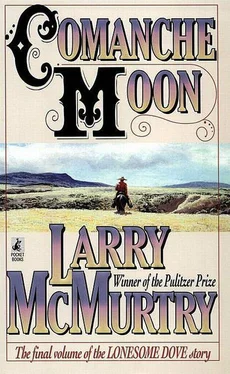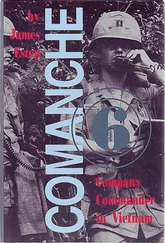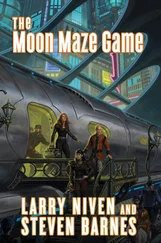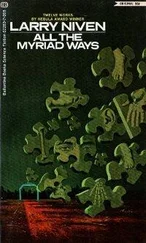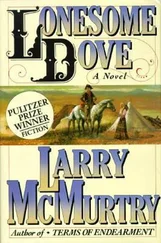When he reached the lip of the canyon Buffalo Hump didn't stop--he rode north and west, all night, only stopping when dawn touched the sky. He wanted to ride to the empty places, the land where he was not likely to meet any of the People, or any whites either. He had left the tribe forever--he wanted to see no more humans. Most of the talk of human beings was silly talk, talk that was of less weight than a man's breath. He had taken leave of all such silliness. He wanted to go where he could only hear the wind, and whatever animals might be moving near him--the little animals, ground squirrels and mice, that lived under the grass.
The thing that Buffalo Hump was most grateful for, as he rode into the emptiness, was the knowledge that in the years of his youth and manhood he had drawn the lifeblood of so many enemies. He had been a great killer; it was his way and the way of his people; no one in his tribe had killed so often and so well.
The killings were good to remember, as he rode his old horse deeper into the llano, away from all the places where people came.
"I feel like I've been around this ring once too often, Woodrow," Augustus said.
"Don't you? The same governor we used to work for wants to send us after the same outlaw we ought to have killed way back when Inish Scull was our boss." The governor he was referring to was e. m.
Pease, one of the few able men willing to take the provisional governorship under the terms of a harsh Reconstruction; the outlaw in question was Blue Duck, whose band of murderers was making travel hazardous from the Sabine to the Big Wichita. The army was busy trying to subdue the few remaining free Comanches; the rangers were depleted in numbers and in spirit, but they were still the only force capable of dealing with general lawlessness of a magnitude likely to be beyond the scope of local sheriffso.
"I agree we ought to have killed him then," Call said. "But we didn't. Now will have to do." "I dislike it!" Augustus said. His face was red and his neck swelled, as it was likely to do when he was in a temper. Why the temper, Call didn't understand. Governor Pease had been meek as a mouse when he called them in and asked them to go after Blue Duck.
"I can see you're riled but I don't know why," Call said. "Governor Pease was polite--he's always been polite." "I ain't a policeman, that's why I'm riled," Augustus said. "I don't mind hanging a fat bandit, or a skinny one either, if they're handy, but I've been a free ranger all this time and I don't like being told that all I'm good for is hanging bandits and putting drunks in jail. We ain't to fight Indians now, unless it's to save our hair. We can't chase a bandit across the Rio Grande. I feel handcuffed and I'm ready to quit." "You've been ready to quit ever since you joined up with Major Chevallie," Call said.
He knew, though, that Gus's complaint was mainly valid. All they had been given to do lately was cool off feuding families, of which there were plenty among the land-grabbing settlers pushing into lands the Comanches were no longer able to contest. The country was changing--it wasn't the Governor's fault.
Call meant to point out that Blue Duck was no modest bandit. He was Buffalo Hump's son, and his gang of ruffians had taken more than forty lives along the military trail that led from Fort Smith to Santa Fe. That trail, blazed by the great Captain Marcy himself, passed through the Cross Timbers and the southern plains.
Before he could present his arguments, though, Augustus marched into a saloon--when in town, he was seldom outside the saloons. Whenever he was annoyed or bored, Augustus drank--and he was all too frequently annoyed or bored. In that, he was no exception, of course; the frontier was laced with whiskey.
What Call could not contest was Gus's fury at the diminished status of the rangers. For years the rangers had provided what protection the frontier families had; it was hard, now, to find themselves treated as no better than local constables.
Call, as much as Gus, wanted to be done with it, but he could not feel right about refusing a request from Governor Pease, a kind man who had fought with the legislature many times in his earlier term to get the rangers what they needed in the way of supplies, horses, and weaponry.
He thought that catching or killing Blue Duck was something they ought to do--once they had done it, that would be enough. They could quit their rangering then, though what they would do once they quit he didn't know. Cattle ranching was the new thing--hundreds of thousands of Texas cattle were being driven north every year now. Once, while in San Antonio, he and Gus had ridden out with Captain King to watch one of his herds pass--some four thousand cattle in all. They were being skillfully handled by experienced vaqueros, a sight that interested Call but immediately bored Gus, for the vaqueros were mainly letting the cattle graze along at their own pace.
"Watching weeds turn brown is more interesting than this," Augustus said. "I could have stayed in the saloon and looked out the window at a donkey eating a prickly pear. It would have been just as much fun, and besides, I'd be drunk." This sally caused Captain King to laugh heartily.
"Use your mind's eye, Captain," he said. "Think of the East, the teeming millions." "The what?" Gus asked.
"The people, sir," Captain King said. "The millionaires and the beggars. The English, the Irish, the Italians, the Poles--the Swedes and the Jews. People in the finest New York mansions will soon be eating this beef. The cooks in Boston, Baltimore, Philadelphia, and Washington will soon be cooking it." "Why, what a bother--y'd take cattle all that way so a bunch of foreigners can eat beef? Let them grow their own beef, I say." "But there's no room, sir--the East is mighty crowded," Captain King explained.
"Beef is what will bring Texas back from the war. Cotton won't do it. There's too damn much cotton in the world now. But beef? That's different. All the starving Irish who have never tasted anything except the potato in their entire lives will pay for beef." "Me, I'd rather have whores," Augustus said.
"Me, sorting dry goods, no thank you," Augustus had said, when Call once mentioned the possibility of their buying a store. He had given a similarly dismissive reply to several other ideas Call had floated. Only the notion of running a livery stable seemed to arouse his interest, if only because--z Gus envisioned the enterprise--there would be Pea Eye and Deets to do the work, whereas he would take the money to the bank and perhaps wet his whistle, against the drought, on the way back.
The thought of owning a livery stable affected Gus much as the thought of the beef-eating millionaires affected Captain King. Every time a livery stable was mentioned, around the bunkhouse, Gus would get a light in his eye and would soon be spinning notions that made the contemplated livery stable unlike any Call, or Pea, or Deets had ever seen.
"Of course, we wouldn't have to just rent horses," he said, one blazing day when the group of them were sitting in the shade of a big mesquite, behind the bunkhouse.
"No, we could rent a mule or two, if we had a couple," Call allowed, only to draw from Augustus the look of scorn he reserved for the hopelessly unimaginative.
"I wasn't talking about mules, Woodrow," he said. "A mule is just a lesser horse, and so is a donkey." "They may be lesser, but a lot of people would rather rent a mule than a horse, I imagine," Pea Eye said. "A mule won't step in a hole, and a horse will." "You're out of your depth when it comes to commerce, Pea," Gus said. "You should keep your tongue back there behind your teeth." Call was puzzled.
"What other kind of animls would you be renting, then?" he asked, though he knew Augustus was probably just launching into one of the elaborate leg pulls he loved so much. He particularly loved them when he had the credulous Deets and Pea to confound and dumbfound.
Читать дальше
